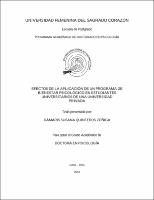| dc.contributor.advisor | Figueroa Pozo, Hilda Mercedes Manuela | |
| dc.contributor.author | Quinteros Zúñiga, Dámaris Susana | |
| dc.date.accessioned | 2017-01-31T20:13:20Z | |
| dc.date.available | 2017-01-31T20:13:20Z | |
| dc.date.issued | 2013 | |
| dc.identifier.uri | http://hdl.handle.net/20.500.11955/225 | |
| dc.description.abstract | Este estudio fue diseñado con el objetivo de elaborar y evaluar un programa de bienestar psicológico (Probienestar), dirigido a estudiantes del primer año de una universidad privada de Lima. El Probienestar fue construido tomando como referencia el modelo teórico de Ryff (1989), quien distingue seis dimensiones que configuran el bienestar psicológico. La hipótesis general plantea que si se aplica el programa de bienestar psicológico entonces variará el nivel de bienestar psicológico en los participantes; y las hipótesis específicas plantean esta variación del bienestar psicológico en términos de autoaceptación, dominio del ambiente, afectos positivos, desarrollo personal, autonomía y autodeterminación. Se contó con un diseño de dos grupos con pre y postest al grupo experimental y postest al grupo control. El programa se ejecutó en el lapso de 2 meses y medio a través de 13 sesiones, donde se realizaron actividades individuales y grupales. La edad de los participantes osciló entre 16 y 28 años y fueron de ambos sexos; así, el grupo experimental estuvo conformado por 17 estudiantes y control por 18. Los resultados indicaron que el nivel de bienestar psicológico en el grupo experimental, evaluado antes y después de la aplicación del Probienestar, no se incrementó significativamente, pero tampoco decreció. Mientras que en la comparación del nivel de bienestar psicológico entre los grupos experimental y control sí se hallaron diferencias significativas, encontrándose un mayor nivel de bienestar a nivel global y en todas las dimensiones en los estudiantes que participaron del Probienestar. | es_PE |
| dc.description.abstract | This study was designed with the aim to develop and to evaluate a psychological wellbeing program (Probienestar), aimed to students of the first year of a private university in Lima. Probienestar was built with reference to the theoretical model of Ryff (1989), who distinguishes six dimensions that set the psychologycal welfare. The general hypothesis states that if the psychological program is applied then the level of psychological wellbeing in participants will vary; and specific hypotheses pose this variation of psychological wellfare in terms of self-acceptance, enviromental mastery, positive affects, personal development, auntonomy and self-determination. It was counted with a two -group design with pre-and posttest to the experimental group and a posttest to the control group. The program was implemented in the lapse of 2 months and a half through 13 sessions, where individual and group activities were done. The age of participants ranged between 16 and 28 years from both sexes, so the experimental group consisted of 17 students and the control group of 18. The results indicated that the level of psychological wellbeing in the experimental group, measured before and after application of Probienestar did not increased significantly, but it did not decreased either. While comparing the level of psychological wellbeing between experimental and control groups significant differences were found, having a higher level of globally wellfare and in all dimensions in students who participated in the Probienestar program. | es_PE |
| dc.description.uri | Tesis | |
| dc.format | application/pdf | es_PE |
| dc.language.iso | spa | es_PE |
| dc.publisher | Universidad Femenina del Sagrado Corazón | es_PE |
| dc.rights | info:eu-repo/semantics/closedAccess | es_PE |
| dc.rights.uri | https://creativecommons.org/licenses/by-nc-nd/4.0/ | es_PE |
| dc.source | Repositorio Institucional - UNIFÉ | |
| dc.subject | Psicología positiva | |
| dc.subject | Bienestar (Psicología) | |
| dc.subject | Psicología--Tesis | |
| dc.title | Efectos de la aplicación de un programa de bienestar psicológico en estudiantes universitarios de una universidad privada | es_PE |
| dc.type | info:eu-repo/semantics/doctoralThesis | es_PE |
| thesis.degree.name | Doctora en Psicología | es_PE |
| thesis.degree.grantor | Universidad Femenina del Sagrado Corazón. Escuela de Posgrado | es_PE |
| thesis.degree.level | Doctorado | es_PE |
| thesis.degree.discipline | Psicología | es_PE |
| dc.subject.ocde | https://purl.org/pe-repo/ocde/ford#5.01.01 | es_PE |
| renati.advisor.dni | 10255522 | |
| renati.advisor.orcid | https://orcid.org/0000-0002-4711-879X | es_PE |
| renati.author.dni | 10174438 | |
| renati.discipline | 313028 | es_PE |
| renati.juror | Figueroa Pozo, Hilda Mercedes Manuela | es_PE |
| renati.juror | Torres T., William | es_PE |
| renati.juror | Chan Bazalar, Luis Alberto | es_PE |
| renati.juror | Alarcón Alarcón, Rosario Guadalupe | es_PE |
| renati.level | https://purl.org/pe-repo/renati/level#doctor | es_PE |
| renati.type | https://purl.org/pe-repo/renati/type#tesis | es_PE |
| dc.publisher.country | PE | es_PE |


